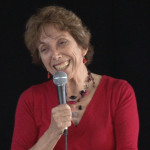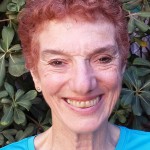My reading
Haftarah B’reishit
Isaiah 42:5 - 43:10
42:5 כֹּֽה־אָמַ֞ר הָאֵ֣ל׀ יְהוָ֗ה בּוֹרֵ֤א הַשָּׁמַ֙יִם֙ וְנ֣וֹטֵיהֶ֔ם רֹקַ֥ע הָאָ֖רֶץ וְצֶאֱצָאֶ֑יהָ נֹתֵ֤ן נְשָׁמָה֙ לָעָ֣ם עָלֶ֔יהָ וְר֖וּחַ לַהֹלְכִ֥ים בָּֽהּ׃
42:6 אֲנִ֧י יְהוָ֛ה קְרָאתִ֥יךָֽ בְצֶ֖דֶק וְאַחְזֵ֣ק בְּיָדֶ֑ךָ וְאֶצָּרְךָ֗ וְאֶתֶּנְךָ֛ לִבְרִ֥ית עָ֖ם לְא֥וֹר גּוֹיִֽם׃
42:7 לִפְקֹ֖חַ עֵינַ֣יִם עִוְר֑וֹת לְהוֹצִ֤יא מִמַּסְגֵּר֙ אַסִּ֔יר מִבֵּ֥ית כֶּ֖לֶא יֹ֥שְׁבֵי חֹֽשֶׁךְ׃
42:8 אֲנִ֥י יְהוָ֖ה ה֣וּא שְׁמִ֑י וּכְבוֹדִי֙ לְאַחֵ֣ר לֹֽא־אֶתֵּ֔ן וּתְהִלָּתִ֖י לַפְּסִילִֽים׃
42:9 הָרִֽאשֹׁנ֖וֹת הִנֵּה־בָ֑אוּ וַֽחֲדָשׁוֹת֙ אֲנִ֣י מַגִּ֔יד בְּטֶ֥רֶם תִּצְמַ֖חְנָה אַשְׁמִ֥יע אֶתְכֶֽם׃
42:10 שִׁ֤ירוּ לַֽיהוָה֙ שִׁ֣יר חָדָ֔שׁ תְּהִלָּת֖וֹ מִקְצֵ֣ה הָאָ֑רֶץ יוֹרְדֵ֤י הַיָּם֙ וּמְלֹא֔וֹ אִיִּ֖ים וְיֹשְׁבֵיהֶֽם׃
42:11 יִשְׂא֤וּ מִדְבָּר֙ וְעָרָ֔יו חֲצֵרִ֖ים תֵּשֵׁ֣ב קֵדָ֑ר יָרֹ֙נּוּ֙ יֹ֣שְׁבֵי סֶ֔לַע מֵרֹ֥אשׁ הָרִ֖ים יִצְוָֽחוּ׃
42:12 יָשִׂ֥ימוּ לַֽיהוָ֖ה כָּב֑וֹד וּתְהִלָּת֖וֹ בָּאִיִּ֥ים יַגִּֽידוּ׃
42:13 יְהוָה֙ כַּגִּבּ֣וֹר יֵצֵ֔א כְּאִ֥ישׁ מִלְחָמ֖וֹת יָעִ֣יר קִנְאָ֑ה יָרִ֙יעַ֙ אַף־יַצְרִ֔יחַ עַל־אֹיְבָ֖יו יִתְגַּבָּֽר׃
42:14 הֶחֱשֵׁ֙יתִי֙ מֵֽעוֹלָ֔ם אַחֲרִ֖ישׁ אֶתְאַפָּ֑ק כַּיּוֹלֵדָ֣ה אֶפְעֶ֔ה אֶשֹּׁ֥ם וְאֶשְׁאַ֖ף יָֽחַד׃
42:15 אַחֲרִ֤יב הָרִים֙ וּגְבָע֔וֹת וְכָל־עֶשְׂבָּ֖ם אוֹבִ֑ישׁ וְשַׂמְתִּ֤י נְהָרוֹת֙ לָֽאִיִּ֔ים וַאֲגַמִּ֖ים אוֹבִֽישׁ׃
42:16 וְהוֹלַכְתִּ֣י עִוְרִ֗ים בְּדֶ֙רֶךְ֙ לֹ֣א יָדָ֔עוּ בִּנְתִיב֥וֹת לֹֽא־יָדְע֖וּ אַדְרִיכֵ֑ם אָשִׂים֩ מַחְשָׁ֨ךְ לִפְנֵיהֶ֜ם לָא֗וֹר וּמַֽעֲקַשִּׁים֙ לְמִישׁ֔וֹר אֵ֚לֶּה הַדְּבָרִ֔ים עֲשִׂיתִ֖ם וְלֹ֥א עֲזַבְתִּֽים׃
42:17 נָסֹ֤גוּ אָחוֹר֙ יֵבֹ֣שׁוּ בֹ֔שֶׁת הַבֹּטְחִ֖ים בַּפָּ֑סֶל הָאֹמְרִ֥ים לְמַסֵּכָ֖ה אַתֶּ֥ם אֱלֹהֵֽינוּ׃
42:18 הַחֵרְשִׁ֖ים שְׁמָ֑עוּ וְהַעִוְרִ֖ים הַבִּ֥יטוּ לִרְאֽוֹת׃
42:19 מִ֤י עִוֵּר֙ כִּ֣י אִם־עַבְדִּ֔י וְחֵרֵ֖שׁ כְּמַלְאָכִ֣י אֶשְׁלָ֑ח מִ֤י עִוֵּר֙ כִּמְשֻׁלָּ֔ם וְעִוֵּ֖ר כְּעֶ֥בֶד יְהוָֽה׃
42:20 ראית [רָא֥וֹת] רַבּ֖וֹת וְלֹ֣א תִשְׁמֹ֑ר פָּק֥וֹחַ אָזְנַ֖יִם וְלֹ֥א יִשְׁמָֽע׃
42:21 יְהוָ֥ה חָפֵ֖ץ לְמַ֣עַן צִדְק֑וֹ יַגְדִּ֥יל תּוֹרָ֖ה וְיַאְדִּֽיר׃
42:22 וְהוּא֮ עַם־בָּז֣וּז וְשָׁסוּי֒ הָפֵ֤חַ בַּֽחוּרִים֙ כֻּלָּ֔ם וּבְבָתֵּ֥י כְלָאִ֖ים הָחְבָּ֑אוּ הָי֤וּ לָבַז֙ וְאֵ֣ין מַצִּ֔יל מְשִׁסָּ֖ה וְאֵין־אֹמֵ֥ר הָשַֽׁב׃
42:23 מִ֥י בָכֶ֖ם יַאֲזִ֣ין זֹ֑את יַקְשִׁ֥ב וְיִשְׁמַ֖ע לְאָחֽוֹר׃
42:24 מִֽי־נָתַ֨ן למשוסה [לִמְשִׁסָּ֧ה] יַעֲקֹ֛ב וְיִשְׂרָאֵ֥ל לְבֹזְזִ֖ים הֲל֣וֹא יְהוָ֑ה ז֚וּ חָטָ֣אנוּ ל֔וֹ וְלֹֽא־אָב֤וּ בִדְרָכָיו֙ הָל֔וֹךְ וְלֹ֥א שָׁמְע֖וּ בְּתוֹרָתֽוֹ׃
42:25 וַיִּשְׁפֹּ֤ךְ עָלָיו֙ חֵמָ֣ה אַפּ֔וֹ וֶעֱז֖וּז מִלְחָמָ֑ה וַתְּלַהֲטֵ֤הוּ מִסָּבִיב֙ וְלֹ֣א יָדָ֔ע וַתִּבְעַר־בּ֖וֹ וְלֹא־יָשִׂ֥ים עַל־לֵֽב׃
43:1 וְעַתָּ֞ה כֹּֽה־אָמַ֤ר יְהוָה֙ בֹּרַאֲךָ֣ יַעֲקֹ֔ב וְיֹצֶרְךָ֖ יִשְׂרָאֵ֑ל אַל־תִּירָא֙ כִּ֣י גְאַלְתִּ֔יךָ קָרָ֥אתִי בְשִׁמְךָ֖ לִי־אָֽתָּה׃
43:2 כִּֽי־תַעֲבֹ֤ר בַּמַּ֙יִם֙ אִתְּךָ־אָ֔נִי וּבַנְּהָר֖וֹת לֹ֣א יִשְׁטְפ֑וּךָ כִּֽי־תֵלֵ֤ךְ בְּמוֹ־אֵשׁ֙ לֹ֣א תִכָּוֶ֔ה וְלֶהָבָ֖ה לֹ֥א תִבְעַר־בָּֽךְ׃
43:3 כִּ֗י אֲנִי֙ יְהוָ֣ה אֱלֹהֶ֔יךָ קְד֥וֹשׁ יִשְׂרָאֵ֖ל מוֹשִׁיעֶ֑ךָ נָתַ֤תִּי כָפְרְךָ֙ מִצְרַ֔יִם כּ֥וּשׁ וּסְבָ֖א תַּחְתֶּֽיךָ׃
43:4 מֵאֲשֶׁ֨ר יָקַ֧רְתָּ בְעֵינַ֛י נִכְבַּ֖דְתָּ וַאֲנִ֣י אֲהַבְתִּ֑יךָ וְאֶתֵּ֤ן אָדָם֙ תַּחְתֶּ֔יךָ וּלְאֻמִּ֖ים תַּ֥חַת נַפְשֶֽׁךָ׃
43:5 אַל־תִּירָ֖א כִּ֣י אִתְּךָ־אָ֑נִי מִמִּזְרָח֙ אָבִ֣יא זַרְעֶ֔ךָ וּמִֽמַּעֲרָ֖ב אֲקַבְּצֶֽךָּ׃
43:6 אֹמַ֤ר לַצָּפוֹן֙ תֵּ֔נִי וּלְתֵימָ֖ן אַל־תִּכְלָ֑אִי הָבִ֤יאִי בָנַי֙ מֵרָח֔וֹק וּבְנוֹתַ֖י מִקְצֵ֥ה הָאָֽרֶץ׃
43:7 כֹּ֚ל הַנִּקְרָ֣א בִשְׁמִ֔י וְלִכְבוֹדִ֖י בְּרָאתִ֑יו יְצַרְתִּ֖יו אַף־עֲשִׂיתִֽיו׃
43:8 הוֹצִ֥יא עַם־עִוֵּ֖ר וְעֵינַ֣יִם יֵ֑שׁ וְחֵרְשִׁ֖ים וְאָזְנַ֥יִם לָֽמוֹ׃
43:9 כָּֽל־הַגּוֹיִ֞ם נִקְבְּצ֣וּ יַחְדָּ֗ו וְיֵאָֽסְפוּ֙ לְאֻמִּ֔ים מִ֤י בָהֶם֙ יַגִּ֣יד זֹ֔את וְרִֽאשֹׁנ֖וֹת יַשְׁמִיעֻ֑נוּ יִתְּנ֤וּ עֵֽדֵיהֶם֙ וְיִצְדָּ֔קוּ וְיִשְׁמְע֖וּ וְיֹאמְר֥וּ אֱמֶֽת׃
43:10 אַתֶּ֤ם עֵדַי֙ נְאֻם־יְהוָ֔ה וְעַבְדִּ֖י אֲשֶׁ֣ר בָּחָ֑רְתִּי לְמַ֣עַן תֵּ֠דְעוּ וְתַאֲמִ֨ינוּ לִ֤י וְתָבִ֙ינוּ֙ כִּֽי־אֲנִ֣י ה֔וּא לְפָנַי֙ לֹא־נ֣וֹצַר אֵ֔ל וְאַחֲרַ֖י לֹ֥א יִהְיֶֽה׃










